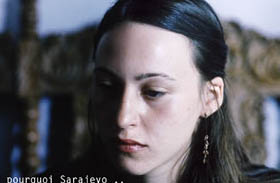Too much content and too many questions in Godard’s poetics.
French cinema’s grand-daddy of auteurist filmmakers stitches together a three-pieced discussion that shows how war gets filtered into our collective consciousness. Inside Jean-Luc Godard’s Our Music, we find Hell, Purgatory, and Paradise – this exposition takes the audience through Godard’s own poetic reflection of the history of humanity. In the first chapter, Godard explores the monstrosities of war by way of a montage of images that juxtaposes documentary war footage with an eloquent piano-scored – it’s a short overture, perhaps forceful introduction that features among other items – Germany’s past and the KKK present. In Purgatory, we find Godard in the frame, documenting his own academic trip to the ravaged Sarajevo – where he discusses a palette-filled of issues with University students. From the virtues of poeticism and visual imagery, the current conflict between Palestine and Israel and to a frustrating long fantasy sequence about book burning, Godard brings many topics into the heavy discussion. The film’s final resting spot sees a young student taking a momentary break away from all the talk – the wordless, long sequence displays a beautiful stream amongst reminders of war – it also forges the debate of the future of cinema with Godard’s own views of how technology is changing some of the rules, and thus changing the viewer’s perspective of man’s worst act. Like the location – its about rebuilding a bridge with history, about using the acts of past acts as a reminder no matter how it is recorded. Adding one more piece to a lifetime’s work of unconventional material, Godard certainly doesn’t believe in conventional narrative, Notre Musique dissects the medium – but while he manages to throw in many ideas – the spectrum is far too big for one 80-minute piece, making this a slightly bewildering watch.
